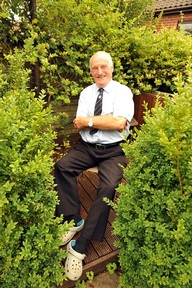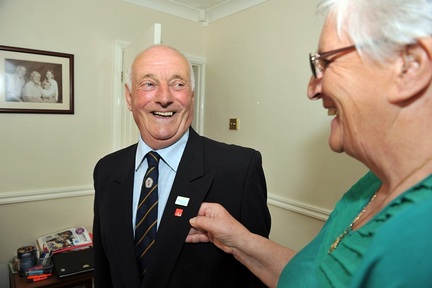An inspiration for those living with dementia: why Trevor Jarvis refuses to give in
“My head is a shed and it can take a while to find the right tools,” is how Trevor Jarvis starts his lectures on dementia that he has given regularly since he was diagnosed with vascular dementia in 2001, following a stroke at work.

Trevor, who was 59 at the time and a health and safety officer, has not only refused to let this degenerative disease dominate his life but has thrown himself heart and soul into raising awareness of those living with dementia and how people both within the health sector and beyond can help.
Trevor says: “I must have talked to thousands of people by now in the UK. I am an Ambassador for the Alzheimer’s Society, a Dementia Friends’ champion and a fully qualified trainer. I regularly talk about my experiences at everywhere from care homes to hospitals, such as Sheffield and Bradford [with a view to giving people insight into what it is like living with dementia]. He also visits schools to tell children about Dementia Friends, a role he particularly enjoys.
He is lucky enough to have had wonderful support from family and friends, in particular his wife and carer, Ann, but as he puts it: “Talking about dementia helps me to stay well – and control it rather than it controlling me. It keeps me going.”
Everyday challenges
His lectures are humorous, inspiring and moving. In them he explains how he has overcome some of the limitations of his condition. One thing he found most frustrating was not being able to tie his own ties or shoelaces anymore. But, with a little lateral thinking, solutions can often be found to everyday problems. Now his son has pre-tied all his ties for him so he doesn’t have to rely on Ann to help him dress. And Trevor now wears slip-on shoes. He cannot make short-term memories, and so cannot remember new people or what he had for lunch. But he can remember his lecture, if he enters the lecture theatre through the same door each time.
Indeed Trevor approaches all new challenges facing him in a methodical manner. He has highlighted the hazards of an ordinary garden, such as an electric lawn mower or window panes in a greenhouse, for a person with dementia. He says: “There are many, many hazards in the home and garden for a person living with dementia, particularly if the person is living alone. Even a simple thing like making a cup of tea can be a problem in itself.
“Going into the kitchen wondering where’s the kettle, where’s the milk, is the milk out of date, remembering to light the gas stove if you have one – everyday tasks when you break them down are tremendously complicated.”
He has even taken on the high street banks and through sheer determination helped to change their policy on signature bank cards, a helpful tool for anyone who now has difficulty with numbers. “One of my greatest successes concerned the banks. My wife wants to help me stay independent so we were in a bank one day and they treated me rudely when I couldn’t remember my chip and pin code, so I threatened to take them to the European courts.”
The upshot was that now people with any form of disability can get a signature card and sign for money,” says Trevor. “I feel very strongly that a person with a disability should have access to their money.”
Increasing awareness
Trevor is the first to acknowledge that the nation’s awareness of dementia has been raised in the last few years. He says: “We are getting there, but Rome was not built in a day. We have laid the foundations – there is a long way to go, but we are getting there.”

One thing that he still finds it hard to come to terms with is that people sometimes ignore a person living with dementia. “What I can’t deal with is that all too often people don’t talk to you directly. When for instance I’m out with my wife – they ask Ann, ‘How’s he doing?’ “ he says.
“Because I’ve had a stroke and been diagnosed with dementia, doesn’t mean that I can’t speak for myself. Obviously how a person with dementia responds will depend on the severity of their condition – but in my case I always reply to them directly: ‘I’m fine thank you.’ People generally need a better understanding of dementia.”
He feels too that training of care workers and nurses still has a way to go. “I would make sure that no carer or nurse had access to any person living with dementia until they had been on a course.
“There simply is not enough or adequate training to help those carers or nurses who deal with clients or patients with dementia. It is essential that they are taught to respect the person, go with them, learn their likes and dislikes, and hobbies. And I think a course such as this should be repeated every three years.”
Trevor is clearly a man who refuses to let a disability define or limit him.
Peter Rose, director of Find, a Leeds-based company that designs dementia-friendly signs for some of the hospitals that Trevor lecturers in says: “I think it’s fair to say that Trevor's misfortune to have vascular dementia is paradoxically an absolute gift to everyone else. His brightness of spirit is infectious and a few minutes with Trevor is guaranteed to brighten anyone's day.
“It's grossly unfair that Trevor should have dementia added to his list of challenges, but when we say 'see the person, not the dementia' there's no better example of why this is an important attitude for everyone to adopt.”
Interesting facts
First job: As a young boy of 15, I started my working life as a gardener
Favourite film: Goodbye Mr Chips
Favourite piece of music: Anything by the Three Tenors
Best presents you have received: My wife gave me two sons, and I now have four grandchildren, two boys and two girls
Last holiday: Tenerife
Latest Features News
 28-Nov-19
2019 Election: Labour pledges £10.8 bn for free personal care while Boris Johnson sidelines social care
28-Nov-19
2019 Election: Labour pledges £10.8 bn for free personal care while Boris Johnson sidelines social care
 18-Oct-19
Podcast: Wendy Mitchell and dementia: 'My biggest fear is not knowing who my daughters are'
18-Oct-19
Podcast: Wendy Mitchell and dementia: 'My biggest fear is not knowing who my daughters are'
 30-Sep-19
World's oldest diver aged 96 says 'never accept the fact you are getting old'
30-Sep-19
World's oldest diver aged 96 says 'never accept the fact you are getting old'
 27-Sep-19
Exclusive: Care minister backs care workers' call for time off to grieve and attend funerals
27-Sep-19
Exclusive: Care minister backs care workers' call for time off to grieve and attend funerals
 20-Sep-19
Podcast: Gyles Brandreth urges care workers to learn poetry with elderly
20-Sep-19
Podcast: Gyles Brandreth urges care workers to learn poetry with elderly